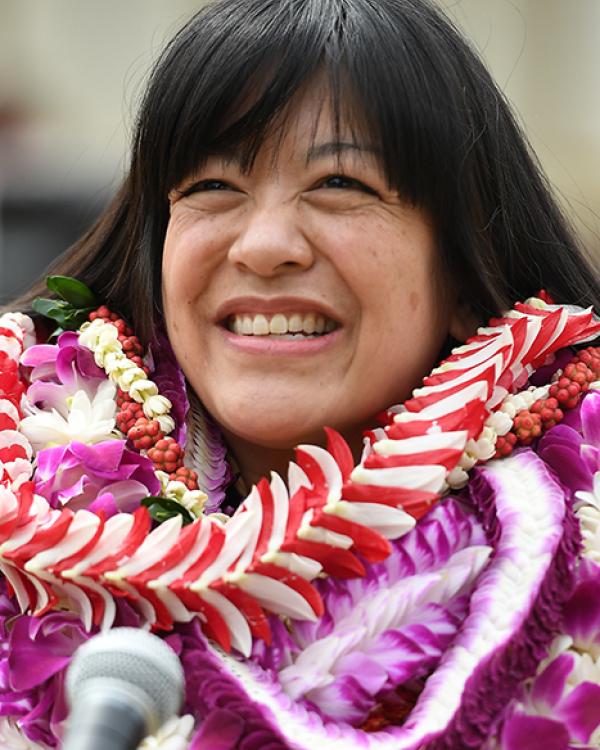
(photo courtesy Milken Family Foundation)
Michelle Iwasaki—TEP alumna, academic coach, 18-year star educator at Kalihi Kai Elementary School—went about business as usual on Monday, February 28th, socially distancing chairs and lining kids up for just another Kalihi Kai school-wide assembly, assuming that this event would unfold in the same way every school assembly does.
Behind the curtain, however, as Michelle was in the crowd preparing her camera for school photographs, Hawaii Governor David Ige was preparing to present Mrs. Iwasaki with today’s most prestigious teaching award. Often hailed as the “Oscar of Teaching,'' the Milken Educator Award is many things: it is an acknowledgement of incredibly skillful and impactful teaching work, it is an invitation into the National Milken Educator Network (an instrumental resource for those dedicated to excellent education, composed of more than 2,800 top teachers, principals, and specialists), and it is a generous financial prize of $25,000. In other words, from the moment that Governor Ige stepped onto that stage, announcing the real purpose of the celebration and finally recognizing Mrs. Iwasaki as the Milken Award recipient, Michelle Iwasaki’s education career was forever altered.
With love in their hearts, students and faculty alike shouted and cheered for their beloved long-time teacher as Mrs. Iwasaki, stunned and elated, made her way up onto the stage to receive her well-deserved award.
———
Michelle Iwasaki (she/ her/ Mrs.), hailing from Los Angeles, CA, first graduated from UC Santa Barbara with a Bachelor of Arts in English. During her senior year, in the midst of studying for the LSAT and researching an array of graduate programs, Iwasaki eventually made the decision to honor her passion for elementary-school volunteer work and “go with her gut.” “I could just tell that my instinct was pulling me this way,” she explains. So Michelle stayed put in Santa Barbara for graduate school, attending the Gevirtz School’s Teacher Education Program (TEP), of course.
“Oh, gosh. It was rigorous,” Iwasaki recalls of her time in TEP, “but that’s why it had such a profound impact on me. TEP instructors prepared me above and beyond all of my expectations.”
Michelle specifically applauds TEP’s focus on inclusive teaching styles across cultures. “We had courses explaining how to view teaching different students and content areas through a multicultural lens,” she explains. “Courses like this, coupled with my student-teaching experiences in the field with my mentor teachers, provided me with an excellent education. I'm just so grateful.”
———
A few years later in 2004, Michelle graduated with a Master’s Degree in Teaching and Learning with a special emphasis in English language-learner strategies, and she immediately moved to Honolulu, Hawaii, drawn by the prospect of surfing warm-water waves. “I figured, since I could teach anywhere, why don't I teach where I can surf?” she laughs.
Mrs. Iwasaki began her teaching career at the then struggling Kalihi Kai Elementary School and has now been working there as both a teacher and an academic coach for 18 years. Iwasaki explains, “At one point, we were the lowest performing school on Oahu and the second lowest in the whole state of Hawaii. Something needed to shift. We asked ourselves, ‘What do we need to change? What do we need to implement?’”
Integrating the arts into the classroom—a concept which Iwasaki has always considered imperative— seemed to be exactly what Kalihi Kai school needed in order to thrive. The elementary school partnered with the Turnaround Arts Program (founded by former First Lady Michelle Obama through the President’s Committee on the Arts and Humanities – it has since moved to the Kennedy Center in Washington DC) to become a Turnaround Arts Program (TAP) school.
“To qualify as a TAP school, your school had to be in the lowest performing 5% of schools in the state and we definitely were at the time,” Iwasaki explains. “Shortly after, we ‘graduated’ from the program since we turned our school around and exited Priority status.” By exiting Priority status, Kalihi Kai was no longer an “identified school.” While no longer a TAP school, Kalihi Kai has continued to be an arts integration school still to this day.
Now, 18 years later, the elated Mrs. Iwasaki is proud to announce that “Kalihi Kai Elementary is no longer a low-performing school. In fact, we’re no longer even being monitored. Our students are learning so much and their growth scores are great. We're doing really well.”
Michelle Iwasaki played a feature role in Kalihi Kai elementary school’s success story, so it is no surprise that her fellow faculty were brought to tears at the school assembly when she was presented with this honor.
To close our interview I asked Michelle, “What does the Milken Educator award mean to you?”
“Everybody on our staff has worked so hard to lift up our school and turn it around,” she responds. “And so, for me, the Milken award represents our school’s turnaround journey.”